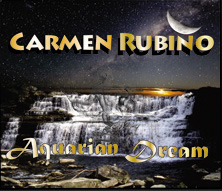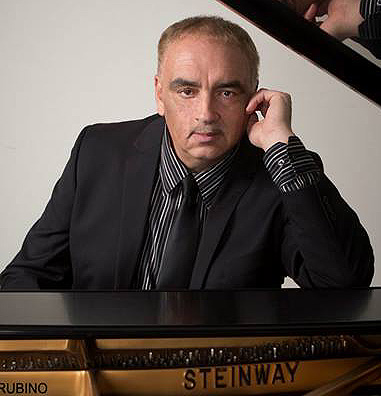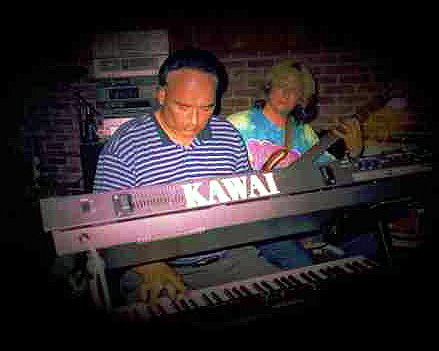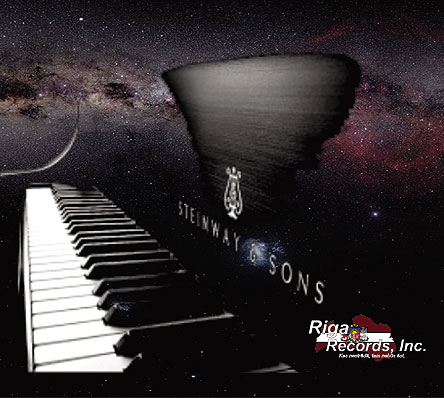 New
Age and modern classical music keyboard fans will be in for a treat
with the 2014 CD release of Aquarian Dream by piano
virtuoso Carmen Rubino. The 12 track CD is filled with superbly
performed piano-based instrumental music that features Carmen's piano
accompanied by his soaring synths. According to the artist’s
web site, the album was composed to be music for your life, as its
backdrop and soundtrack. Giving the album its sparkle and sonic shine,
Carmen employs a wide range of high-tech electronic gear and software.
Speaking about the making of Aquarian Dream in the following
interview, Carmen tells mwe3.com, “I always set the highest
standards possible when writing and recording my music. I then make
sure the instruments are playing at their very best and compliment
the music with their very own identity. My hope is that my listeners
will experience their very own musical journey when listening to Aquarian
Dream, and that the music will preserve a timeless familiarity for
my listeners.” That said, Aquarian Dream is equally
about the sublime sound that Rubino and his co-producer John Barcelona
get in the studio that makes the album so appealing. Carmen's piano
sound is very clear and shimmering and his synth harmonies are very
well orchestrated, enabling Carmen Rubino to sound like a one man
electronic / symphonic orchestra. Fans of Vangelis, Yanni, Mike Pinder's
orchestral rock approach in The Moody Blues and Rick Wakeman’s
instrumental albums will enjoy Carmen Rubino’s brilliant Aquarian
Dream. www.CarmenRubino.com
New
Age and modern classical music keyboard fans will be in for a treat
with the 2014 CD release of Aquarian Dream by piano
virtuoso Carmen Rubino. The 12 track CD is filled with superbly
performed piano-based instrumental music that features Carmen's piano
accompanied by his soaring synths. According to the artist’s
web site, the album was composed to be music for your life, as its
backdrop and soundtrack. Giving the album its sparkle and sonic shine,
Carmen employs a wide range of high-tech electronic gear and software.
Speaking about the making of Aquarian Dream in the following
interview, Carmen tells mwe3.com, “I always set the highest
standards possible when writing and recording my music. I then make
sure the instruments are playing at their very best and compliment
the music with their very own identity. My hope is that my listeners
will experience their very own musical journey when listening to Aquarian
Dream, and that the music will preserve a timeless familiarity for
my listeners.” That said, Aquarian Dream is equally
about the sublime sound that Rubino and his co-producer John Barcelona
get in the studio that makes the album so appealing. Carmen's piano
sound is very clear and shimmering and his synth harmonies are very
well orchestrated, enabling Carmen Rubino to sound like a one man
electronic / symphonic orchestra. Fans of Vangelis, Yanni, Mike Pinder's
orchestral rock approach in The Moody Blues and Rick Wakeman’s
instrumental albums will enjoy Carmen Rubino’s brilliant Aquarian
Dream. www.CarmenRubino.com
mwe3.com presents an interview with
CARMEN RUBINO
 mwe3:
Where are you from originally and where do you live now and what do
you like best about it? I read you’re from Buffalo New York.
mwe3:
Where are you from originally and where do you live now and what do
you like best about it? I read you’re from Buffalo New York.
CARMEN RUBINO: I was born and raised in Buffalo New York and have
lived in Western New York most of my life. Buffalo is referred to
as “The City of Good Neighbors”... it is a close knit community
that reaches out to one another.
mwe3: Your new CD, Aquarian Dream is best described
as a New Age instrumental symphonic masterpiece. Is this your first
album and can you give some info as to how the album came together
and how long it took to write, record and release? It’s interesting
that you and your producer John Barcelona were in a band together
at one time, so I would think there’s a solid musical chemistry
between you and John. How did you work together on creating the Aquarian
Dream album?
CARMEN RUBINO: Aquarian Dream is my debut album; I started
writing the music in 2007. The music began taking shape and form and
it had a clear identity and feel that I desired to maintain throughout
the album. We spent a great deal of time laying out the “bed-tracks”
and building a foundation for the album. Mixing this body of work
was crucial to my discriminating ear. I was then able to mix it into
individual tracks, from my Kurzweil keyboard, down to the production
software. At this time I would reach out to my longtime friend and
engineer, John Barcelona, who has helped me immensely to take the
Aquarian Dream music to the next level.
John’s musicianship was a great help in the studio. He has a
great feel and understanding of my music, over the many years of music
collaboration. John’s engineering abilities gave me the ability
to explore endless possibilities to enhance the music to my lofty
expectations. I tried taking it to a couple commercial mastering studios
but I found that John actually did a much better job than what they
came up with, which to my ear was worse than it was when I brought
it in. John and I mastered the CD from late in 2013 until September
2014, working on the days we both had availability and began release
preparations shortly thereafter.
 mwe3:
Did you have a musical goal with making the Aquarian Dream album
and what do you hope the listener will come away with after playing
the CD?
mwe3:
Did you have a musical goal with making the Aquarian Dream album
and what do you hope the listener will come away with after playing
the CD?
CARMEN RUBINO: I always set the highest standards possible
when writing and recording my music. I then make sure the instruments
are playing at their very best and compliment the music with their
very own identity. My hope is that my listeners will experience their
very own musical journey when listening to Aquarian Dream and
that the music will preserve a timeless familiarity for my listeners.
mwe3: What kind of gear did you use to record the Aquarian
Dream album? Were real pianos and strings used and how were the
various keyboard and piano sounds altered to create that very symphonic
keyboard sound? For example, the CD liner notes mentions you used
Kurzweil music systems. What is the difference in using Kurzweil and
the Alessis gear? You also mention the Guitar Center in Buffalo in
the credits. Are there any guitars on the Aquarian Dream CD
and what other state of the art computer systems were used to make
the CD?
CARMEN RUBINO: The Kurzweil Mark 12 was used to record the
first 16 tracks of each of the songs, for the most part, and certain
tracks were recorded with the Alessis QS6.1. A Behringer XENYX X1832USB
mixing board was used for audio out to a Delta 1010 Sound Board which
was inside a custom built computer built by John. Yamaha studio monitors
were used to monitor mixes. The main mix was first compiled on Sonor
10 but we were not happy with the audio engine. Then we found Samplitude
ProX, which has the best audio engine I have heard. Its functionality
seems all of Pro Tools quality. The main was remixed, and subsequent
mixes were all done with Samplitude. However Samplitude has ample
mastering tools, none were adequate for our purpose.
Then we discovered Isotope Ozone 5, which is a high end mastering
suite. We knew at this point we would then be able to finish after
several unsuccessful mastering efforts. Although we managed to get
an authentic sound for each of the instruments, they were all reproduced
digitally through the superior sound library of the Kurzweil. The
concert grand piano sound is present throughout the album and parameter
adjustments were made to the piano sound, which features a “pong”
effect that uses the stereo field to affect a unique sound.
The elements of this effect are present on the tracks “Tears
of Joy”, “Sacred Vows”, “Transcendence” and
“Aquarian Dream”. The string sections throughout the album
were laid out in multi-octave sections, which provide the full, rich,
orchestral presence. The Guitar Center was the “go to” place
for much of the gear used, though none of which was a guitar. The
guitar sounds, which were “Jazz Guitar” which has a small
presence on the album, and can be heard on “In Our Place”
and a small riff on “Aquarian Dream” but produced by the
Kurzweil as well. The Alessis was used actually sparingly for important
parts, like sound effects.
 mwe3:
How did the CD mixing and mastering impact the overall sound? Were
special steps taken to make sure the sound was distortion free and
clear and clean? Who was involved with you during the mixing and mastering
of the Aquarian Dream CD and can you tell us something about
the very cool CD cover art?
mwe3:
How did the CD mixing and mastering impact the overall sound? Were
special steps taken to make sure the sound was distortion free and
clear and clean? Who was involved with you during the mixing and mastering
of the Aquarian Dream CD and can you tell us something about
the very cool CD cover art?
CARMEN RUBINO: Mixing and mastering was absolutely a critical
part of finalizing the overall sound of the album. The discriminating
placement of the instruments in the mix is something I take very seriously.
I spent considerable time finding the right levels for each of the
instruments. Mastering the album was the most challenging part of
the project. I was very satisfied with the overall mix and did not
want to disturb that final mix. Mastering is a very fine line balancing
act where the recording can change in an instant.
With the help of my longtime friend and engineer John Barcelona and
the great mastering software Isotope Ozone 5, we were able to achieve
and capture the brilliant sounds of the Kurzweil Mark 12 keyboard
and preserve the dynamics that played through the custom Boston Acoustic
system, which had to be recaptured by process, because Kurzweil only
provides a composite out on the Mark 12. The end result is most satisfying
and was well worth our time and effort.
As far as the CD art is concerned... near the beginning of the project,
I knew I wanted “Glen Falls” on the covers, which are the
waterfalls you see. But I didn’t want just a photograph of the
falls, like many of which can be seen around our city. Glen Falls
is in the historic village of Williamsville, New York, a suburb of
Buffalo, which is where I grew up. It also fit, as Aquarius is the
water-bearer. John came up with the making of the Aquarius correlation,
and custom designed an actual picture of Glen Falls with the universal,
and Aquarius correlation, so that it had a cohesive theme.
 mwe3:
It’s interesting to note that you regard YES and the Moody Blues
as being among your big musical influences. When did you first listen
to these bands and others you cite including Jethro Tull. With the
Aquarian Dream CD it sounds like you’re bringing the spirit
of 1970’s symphonic rock into the 21st century. How influential
were rock keyboard innovators like Mike Pinder, who really pioneered
the use of mellotron and that orchestral sound in progressive rock?
Do you draw a line between groups like the Moodies, Tull and YES and
classical artists like Beethoven and Bach, who you also mention on
your web site? It’s interesting and historic to think how these
bands will be considered in fifty or one hundred years.
mwe3:
It’s interesting to note that you regard YES and the Moody Blues
as being among your big musical influences. When did you first listen
to these bands and others you cite including Jethro Tull. With the
Aquarian Dream CD it sounds like you’re bringing the spirit
of 1970’s symphonic rock into the 21st century. How influential
were rock keyboard innovators like Mike Pinder, who really pioneered
the use of mellotron and that orchestral sound in progressive rock?
Do you draw a line between groups like the Moodies, Tull and YES and
classical artists like Beethoven and Bach, who you also mention on
your web site? It’s interesting and historic to think how these
bands will be considered in fifty or one hundred years.
CARMEN RUBINO: I began listening to progressive rock music
in the early 1970’s and developed a greater appreciation for
the music and the musicianship of the great artists of this genre
throughout my lifetime. As I am doing this interview it became known
to me that the band YES did not get into the rock and roll hall of
fame. My reaction is a great disappointment. Which leads me to wonder
how bands like YES and Jethro Tull have not made the rock and roll
hall of fame. These two bands specifically have been playing for decades.
Nearly 50 years of concerts, albums,and to this day are still performing
live. These bands have explored new territories and have matured musically
to the present day. They are the very essence of the progressive rock
genre, from its beginning, and will certainly have a place in the
future generations of music composition. Just as it has been demonstrated
by the great masters of classical music, that are now centuries old.
Mike Pinder, Keith Emerson, Tony Banks, John Tout of Renaissance and
many others were all influential to some extent in my writing style,
as were the writings of Bach and Beethoven. I think on some subconscious
level they all have a part in it, though I don’t think about
any of it while it is happening. I think there is a certain timeless
quality to the themes on Aquarian Dream and if history is a
teacher, it will stand the test of time. As will many of the others
you have mentioned. I am definitely trying to bring the spirit of
all of it together.
mwe3: What track from Aquarian Dream are you planning
to promote the album on video channels like You Tube as well as radio?
How about international promotion and exposure? What is your plan
to bring Aquarian Dream to other countries outside the US and
what are the chances you will do live performances in the future?
 CARMEN
RUBINO: The plans for promotion to this point have been every
track and as much as possible. We have a promotional video on my Youtube
channel, which features every track, and runs 10 minutes. We are talking
about the possibility of “Tears Of Joy” as being the right
length and substance to maybe do something extra. But there are no
direct plans about specific tracks. Certainly if one track or another
gains popularity new plans can be surmised. It can be surprising what
turns out to be popular, so we will give them all a fair chance.
CARMEN
RUBINO: The plans for promotion to this point have been every
track and as much as possible. We have a promotional video on my Youtube
channel, which features every track, and runs 10 minutes. We are talking
about the possibility of “Tears Of Joy” as being the right
length and substance to maybe do something extra. But there are no
direct plans about specific tracks. Certainly if one track or another
gains popularity new plans can be surmised. It can be surprising what
turns out to be popular, so we will give them all a fair chance.
A worldwide radio airplay and print media campaign is already underway
and is progressing weekly. It appears that we are getting a fair amount
of exposure in Russia and the Netherlands. But there are shows in
the UK and all over Europe who have given airplay commitments. Even
a show in Australia is playing tracks. As you can probably see, the
instrumentation in the music makes for an involved live performance.
It could be done digitally as well, but that wouldn’t be as impressive
as an orchestral arrangement. So if the timing and the financial arrangements
were in place, I would certainly consider a live show or tour.
mwe3: Following Aquarian Dream, what kind of direction
would you like to take your music in next? Are you planning to write
and record more music in the coming year and what other plans do you
have for 2015?
 CARMEN
RUBINO: There is currently and existing library of unrecorded
material, as well as unfinished material in addition to that. I will
be carefully selecting pieces and planning to release a second album
in 2015. This new material is in part more of the same but there are
some new territories explored in many of the new pieces. Some are
more toward the progressive side, while maintaining the large symphonic
sound. The early part of 2015 will be largely marketing efforts for
Aquarian Dream. After we have done all that can be done on marketing,
I will be back at the recording studio recording the second album.
CARMEN
RUBINO: There is currently and existing library of unrecorded
material, as well as unfinished material in addition to that. I will
be carefully selecting pieces and planning to release a second album
in 2015. This new material is in part more of the same but there are
some new territories explored in many of the new pieces. Some are
more toward the progressive side, while maintaining the large symphonic
sound. The early part of 2015 will be largely marketing efforts for
Aquarian Dream. After we have done all that can be done on marketing,
I will be back at the recording studio recording the second album.
Thanks to Carmen Rubino and John Barcelona @
www.CarmenRubino.com



